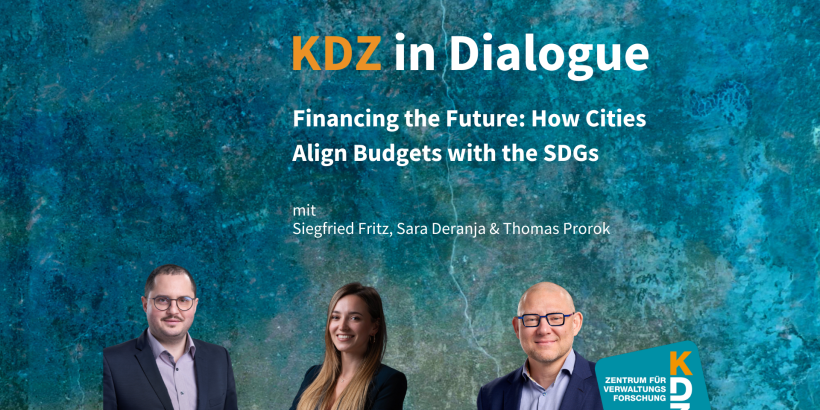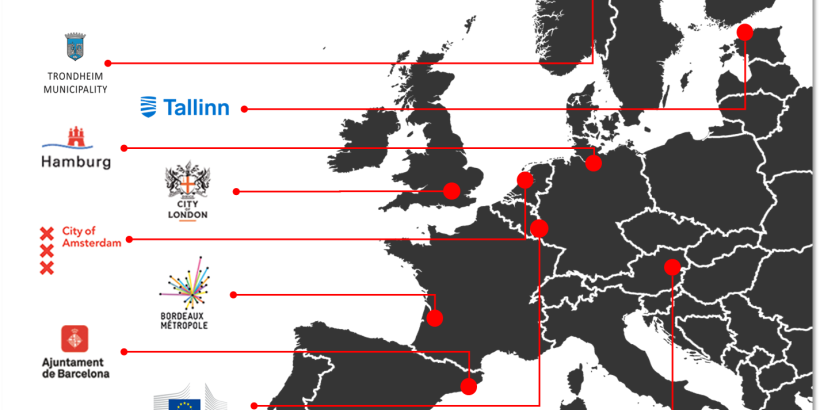Structural and administrative Reforms in the EU
The European Commission published the Communication „Enhancing the European Administrative Space (ComPAct)“ (European Commission, 2023) in October 2023 and is becoming a major player of administrative and structural reforms in the European Union. This is particularly notable since the EU has no primary law competences for these issues and the responsibility for the operation of public administration as well as domestic structures belong solely to the member states.
The beginning of these interventions goes back to the Greek debt crisis in the year 2010 where financial aid from the European Union and the International Monetary Fund was linked to carry out administrative and structural reforms. In 2015, the Task Force for Greece (TFGR) was substituted by the Service Support for Structural Reforms (SRSS) and subsequently the Directorate General Support of Structural Reforms (DG REFORM) of the European Commission. Between 2021 and 2027 the Member States are provided with technical support for administrative and structural reforms with total 864 million Euros via the Technical Support Instrument (European Commission, 2024).
An important milestone was the EUPACK (European Public Administration Country Knowledge (European Commission 2023a)). With EUPACK, the European Commission collects the status quo and reforms of public administrations in the EU member states. The new EUPACK edition is foreseen in 2024. Furthermore, a toolbox for quality in public administration has been created (European Commission, 2017). In this toolbox the European Commission provides inspiring examples for quality action in European public sector organizations.
The European Administrative Space - the new Dimension of Public Administration Reform in the Member States
With the „ComPAct“ a new dimension of structural and administrative reforms in the EU Member States has been initiated by the European Commission. The aim is to put forward a set of actions to better assist Member States’ administrations in preparing for current reform needs and anticipating future trends, based on a common set of public administration principles. (European Commission, 2023, p. 6)
Through three pillars the European Commission plans to assist the Member States’ administrations:
- Pillar 1: The Public Administration Skills Agenda - Foster administrative cooperation between public administrations at all levels to help develop their workforces for current and future challenges.
- Pillar 2: Capacity for Europe’s Digital Decade - Strengthen the capacity of public administrations for their digital transformation.
- Pillar 3: Capacity to lead the green transition - Strengthen the capacity of public administrations to lead the green transition and build resilience.
In fact, „ComPAct“ goes further: Public administration reform of the Member States will get increased attention in the European Semester country reports[1]. I can be expected that the European Commission will enhance the assessment of the administrative and structural settings of the Member States.
Principles of Public Administration - New Standards for Public Administration on the Rise
One month after „ComPAct“ the SIGMA Programme of OECD and the European Commission released the new edition of the "Principles of Public Administration". „The Principles are a comprehensive framework of standards expressing values and behaviours that citizens and businesses can expect from a modern public administration. …. They build on existing EU-acquis, OECD recommendations, other international standards, as well as good practices of the EU and OECD-countries.“ (OECD, 2023, p. 6) The first edition has been published 2014.
The main purpose is to monitor and support public administration reforms in the EU-Candidate Countries on their way to the membership of the European Union. Nevertheless the ComPAct indicates that in future the „Principles of Public Administration“ will also be relevant for the member states. This is especially shown, when „ComPAct“ states that „member states’ public administrations share a set of values, tasks and understanding of good administration, forming a European Administrative Space. A common set of overarching principles underpin the quality of public administration“ (European Commission, 2023).
These „common set of overarching principles“, which are listed in ComPAct, are directly based on the six „Thematic Areas“ of the „Principles of Public Administration“. (European Commission, 2023, p. 7; OECD, 2023 p. 10):
- Strategic vision and leadership that ensures capability, resilience and sustained public trust.
- Coherent, anticipatory, evidence-informed, participatory, digital-ready, and inclusive policymaking.
- An impartial, professional, merit-based, collaborative, and effective civil service, performing in good working conditions.
- High-quality, innovative, human-centric, and accessible public services.
- Subsidiarity, coordination, accountability, openness of public administration, integrity, and oversight of administrative processes.
- Sound and sustainable public finances, underpinned by integrated and comprehensive accruals-based public accounting systems.
It can be expected that the „Principles of Public Administration“ will in near future play a more important role also for the Member States of the European Union. Originally developed for the monitoring and supporting of EU-Candidate Countries „ComPAct“ transfers the „Principles“ to the sphere of the EU-Member States. The use of the „Principles of Public Administration“ for the European Semester country reports of the Member States is a comprehensible next step. On the one side this is a welcome development. On the other side this requires more attention and involvement of the Member States and other relevant stakeholders (e.g. academics).
Multi-Level-Governance - Structural Reforms and Administrative Modernization of Regions and Cities?
The „Principles of Public Administration“ consist of six thematic areas, 32 principles and 270 sub-principles that describe the values, behaviour and effects of good public administration. The new version focuses on the EU strategic key elements of „green agenda“ and „digitalization “. Of particular importance are the new standards for „multi-level-governance“ as formulated in the principles 14 (subsidiarity) and 32 (fiscal autonomy).
- Principle 14: Responsibilities are clearly distributed between levels of government, embracing the principle of subsidiarity and local autonomy, and facilitating inter-institutional co-ordination with effective oversight mechanisms.
- Principle 32: Regional and local governments have resources and adequate fiscal autonomy for exercising their competences, with financial oversight to foster responsible financial management.
These principles are further concretised in „sub-principles“, which - for example - additionally require:
- independent mechanism for resolving conflict of competencies among levels of government,
- effective co-ordination structures between all levels of government,
- diversified revenues and borrowing rights,
- transparent and predictable fiscal equalisation mechanism,
- local taxes, fees and charges, for which they have the power to determine the rate,
- restriction of earmarked transfers to regional and local governments.
Most of these requirements are known from the European Charta of Local Self-Government from the Council of Europe. (Council of Europe, 1985). It is noteworthy that those have a significant impact on the state structures and go beyond the requirement of administrative reforms. Taking into consideration that the European Commission refers directly to the “Principles of Public Administration” in „ComPAct“, it can be assumed that the multi-level governance principles will play a role in discussions about the further development of state structures as well as local and regional levels of the EU Member States.
From today's perspective, it is conceivable that the European Semester Country Reports will touch areas related to multi-level governance, the effective functioning of state structures and issues of local and regional governments in future. Basically this is a positive development and offers the opportunity for mutual learning and the elaboration of common standards. But this requires more attention and involvement of the Member States as well as local and regional government representatives and other relevant stakeholders.
Cooperation Opportunities with the European Commission
Multi-level-governance enters the sphere of the European Administrative Space through the „ComPAct“ and the „Principles of Public Administration“. Additionally, it should also be noted that the European Commission directly addresses the local and regional governments in the „ComPAct“ and announces concrete activities.
Chapter 3 of the „ComPAct“ covers the cooperation for administrative capacity at regional and local level and starts with the general statement that „regional and local public administrations are the closest to people and play a key role in delivering proximity services. They implement 70% of all EU legislation, 90% of climate adaptation policies, and 65% of the Sustainable Development Goals.“ (European Commission, 2023, p. 12).
Four concrete activities concerning local and regional governments are listed:
- Expanding the access of regional and local entities to the Technical Support Instrument (TSI), which supports administrative and structural reforms in the Member States.
- Organising an annual Local Public Administration Day (part of European Week of Regions and Cities).
- Facilitating the creation of consortia and partnerships of local authorities that could pool the competences needed to handle large-scale projects.
- Deepening research into the limitations and opportunities of the administrative capacity of the regional and local administrations.
These four activities demand attention by local and regional government representatives on European level and in the Member States. Till now more than 1.500 reform projects have been supported in the areas of operational capacity and efficiency of public administrations, public financial management, tax administrations, digital economy, climate and energy goals, foreign direct investment, education systems, financing opportunities under the Capital-Markets-Union initiative or dealing with non-performing loans (European Commission, 2024).
A complete overview of the projects is not available. The website publishes selected flagship projects and country factsheets. But several projects already concern local and regional governments and issues of Multi-Level-Governance. For example, the project „Local Government Public Finance Development and Municipal Capacity Building in Hungary“ strengthens the cooperation between the National Association of Local Authorities (TÖOSZ) and the Ministries of Interior and Finance (Council of Europe, 2023).
Conclusions
The European Commission will play an increasingly important role in structural and public administration reforms in the EU Member States. This will also affect the local and regional governments due to the new multi-level-governance focus. The „ComPAct“ offers several opportunities for local and regional representatives to get involved. First steps could be:
- Increasing the awareness of EU Member States and especially the local and region government representatives for the ongoing developments.
- Pro-actively using the Technical Support Instrument for local and regional government related challenges and improving multi-level-governance. Here the question arises if local government associations are accepted as eligible by DG Reform. At least one LGA had its eligibility revoked by DG Reform during the application phase.
- Involvement in the preparation of the yearly Local Public Administration Day, which the European Commission plans during the European Week of Regions and Cities.
- Ensuring the involvement in the research activities of the European Commission concerning the local and regional level. The existing knowledge of local and regional actors and other relevant knowledge holders should be taken into account.
- Knowledge partnerships between the European Commission and local and regional associations, the Committee of the Regions and further knowledge holders should be initiated. The involvement of local and regional representatives in relevant expert groups of the European Commission should be ensured.
- Similar to the EUPACK-project (European Public Administration Country Knowledge) a „LOGPACK“ (Local Government Public Administration Knowledge) is needed. This should include key indicators of local regional governance and finance as well as multi-level governance specifics of the EU Member States. This research should be organised in cooperation with relevant local and regional stakeholders, like Committee of the Regions, Local Government Associations, interested cities and regions, think tanks with local and regional governance and finance knowledge, etc.
These opportunities should be taken seriously and used by local and regional governments, their associations and further relevant actors interested in local and regional governance and finance policy.
References
Council of Europe (1985): European Charta of Local Self-Government, ETS 122, Strasbourg, 1985.
Council of Europe (2023): https://www.coe.int/en/web/good-governance/-/intergovernmental-policy-dialogue-financial-relations-and-data-use-in-hungary-a-peer-review, downloaded 22.12.2023.
European Commission (2017): Quality of Public Administration – A Toolbox for Practitioners, Luxembourg, 2017.
European Commission (2023): Enhancing the European Administrative Space (ComPAct), COM (2023) 667, Brussels, 2023 (https://commission.europa.eu/system/files/2023-10/2023.4890%20HT0423966ENN-final.pdf).
European Commission (2023a), Directorate-General for Structural Reform Support, Stimpson, A., Moretti, C., Lemmik, J., Public administrations in the EU Member States – 2021 overview, Publications Office of the European Union, 2023.
European Commission (2024): https://commission.europa.eu/funding-tenders/find-funding/eu-funding-programmes/technical-support-instrument/technical-support-instrument-tsi_en, downloaded 16.1.2024.
OECD (2023): The Principles of Public Administration, OECD, Paris, 2023 (https://www.sigmaweb.org/publications/Principles-of-Public-Administration-2023.pdf).
[1] See ComPACT page 4: „Through the European Semester, particularly in the dedicated annex on public administration in the country reports, the Commission has increasingly focused its attention on the quality of public administration.“



